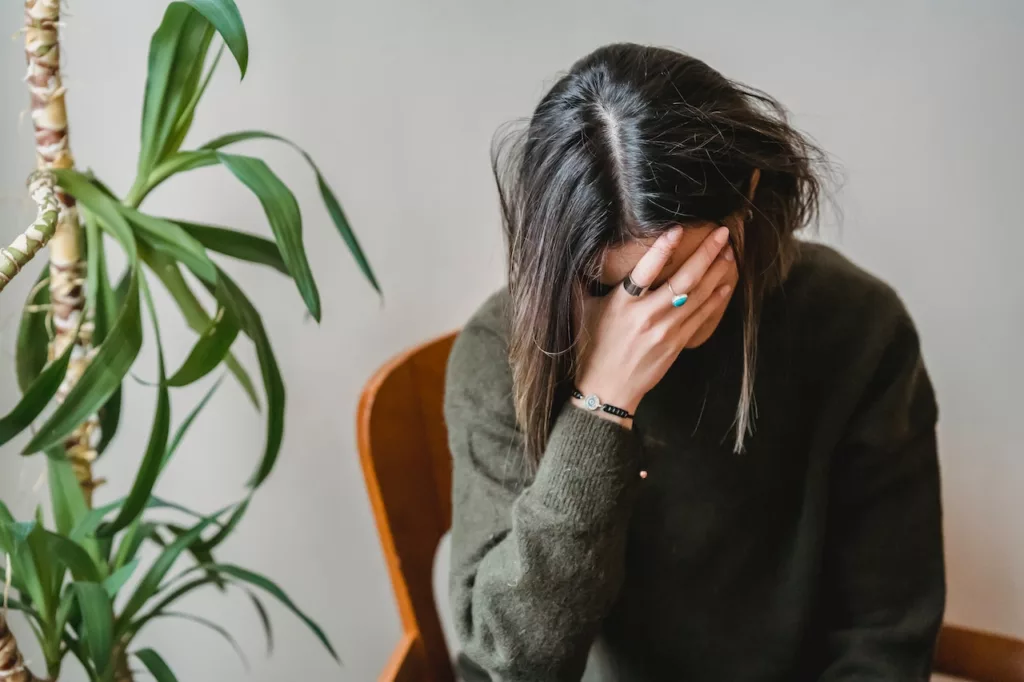What To Do When Depression Hits ?

Depression is a common and serious mental health condition that affects how people feel, think and act. It can cause persistent feelings of sadness, hopelessness, guilt, and loss of interest in activities that were once enjoyable. Depression can also interfere with daily functioning, such as work, school, relationships, and physical health. Depression is not a sign of weakness or a character flaw. It is a treatable illness that can be managed with medication, psychotherapy, or a combination of both. In this article, we’ll explore what to do when depression hits.
Depression can affect anyone, regardless of age, gender, race, culture, or background. However, some factors may increase the risk of developing depression, such as genetics, life events, stress, chronic medical conditions, substance abuse, and personality traits. Depression can also occur along with other mental disorders, such as anxiety, bipolar disorder, post-traumatic stress disorder (PTSD), and eating disorders.
Depression is not the same as feeling sad or blue occasionally. Everyone experiences these emotions from time to time in response to normal life challenges. However, when these feelings last for more than two weeks and interfere with daily life, they may indicate depression. Depression can vary in severity and duration, from mild to severe and from episodic to chronic. The symptoms of depression may also differ depending on the type and subtype of depression.
The most common types of depression are:
– Major depressive disorder (MDD): This is the classic form of depression that causes persistent and severe symptoms that affect multiple aspects of life. To be diagnosed with MDD, a person must have at least five of the following symptoms for at least two weeks: depressed mood most of the day; diminished interest or pleasure in all or almost all activities; significant weight loss or gain; insomnia or hypersomnia; psychomotor agitation or retardation; fatigue or loss of energy; feelings of worthlessness or excessive guilt; difficulty concentrating or making decisions; recurrent thoughts of death or suicide.
– Persistent depressive disorder (PDD): This is a chronic form of depression that lasts for at least two years. The symptoms are similar to those of MDD but less severe. However, they cause significant distress and impairment in daily functioning. A person with PDD may have episodes of major depression superimposed on the persistent low mood.
– Premenstrual dysphoric disorder (PMDD): This is a type of depression that occurs in some women during the week before their menstrual period. The symptoms include mood swings, irritability, anger, anxiety, sadness, hopelessness, fatigue, appetite changes, sleep problems, physical symptoms (such as breast tenderness or bloating), and difficulty concentrating. The symptoms usually improve within a few days after the period starts.
– Seasonal affective disorder (SAD): This is a type of depression that occurs during the fall and winter months when there is less sunlight. The symptoms include low mood, lack of energy, increased appetite and weight gain, oversleeping, social withdrawal, and loss of interest in activities. The symptoms usually improve during the spring and summer months.
– Postpartum depression (PPD): This is a type of depression that affects some women after giving birth. The symptoms include depressed mood, anxiety, crying spells, difficulty bonding with the baby, guilt, shame, fear of harming oneself or the baby, and thoughts of suicide. The symptoms usually start within a few weeks after delivery and can last up to a year.
– Psychotic depression: This is a type of depression that involves delusions or hallucinations that are usually consistent with the depressed mood. For example, a person may believe that they are worthless, guilty, or doomed. They may also hear voices that criticize them or tell them to harm themselves or others.
Depression is a serious condition that requires professional help. If you or someone you know is experiencing signs of depression, do not hesitate to seek help from a qualified mental health provider. There are effective treatments available that can help you cope with your symptoms and improve your quality of life.
Small Steps, Big Impact: Making Lifestyle Changes
Many people want to improve their health and well-being, but they may feel overwhelmed by the idea of making drastic changes to their lifestyle. However, research shows that even small changes can have a big impact on our physical and mental health. In this article, we will explore four simple ways to make positive changes in your life: exercise, journaling, diet, and mindfulness.
Exercise: Taking a Walk Around the Block
One of the easiest and most effective ways to boost your health is to get moving. Exercise can improve your mood, lower your blood pressure, strengthen your bones and muscles, and reduce your risk of chronic diseases. You don’t need to join a gym or run a marathon to reap the benefits of exercise. Even taking a walk around the block can make a difference. Walking can help you burn calories, clear your mind, and connect with nature. Try to walk for at least 10 minutes a day, and gradually increase your distance and speed as you feel comfortable.
Journaling: Tracking Your Experiences
Another simple way to improve your well-being is to write down your thoughts and feelings. Journaling can help you process your emotions, cope with stress, and gain insight into yourself. Journaling can also help you track your progress and achievements, as well as identify areas for improvement. You don’t need to follow any rules or guidelines when journaling. Just write whatever comes to your mind, without judging or censoring yourself. You can journal in the morning, before bed, or anytime you feel like it. You can use a notebook, a computer, or a phone app to record your entries.
Diet: Making Small Changes
What you eat can also have a big impact on your health. Eating a balanced diet can provide you with the nutrients you need to function well and prevent diseases. However, changing your eating habits can be challenging, especially if you are used to eating processed foods or skipping meals. Instead of trying to overhaul your diet overnight, start by making small changes that are easy to maintain. For example, you can swap soda for water, add more fruits and vegetables to your plate, or reduce your portion sizes. You can also plan your meals ahead of time and avoid skipping breakfast.
Mindfulness: Paying Attention to the Present Moment
The last way to make positive changes in your life is to practice mindfulness. Mindfulness is the ability to pay attention to the present moment, without judging or reacting to it. Mindfulness can help you reduce stress, anxiety, and depression, as well as improve your focus, memory, and creativity. You can practice mindfulness in many ways, such as meditation, breathing exercises, yoga, or simply noticing your surroundings. You can practice mindfulness anytime and anywhere, whether you are sitting at your desk, walking in the park, or lying in bed.
One of the most challenging aspects of depression is learning to accept and love yourself. Depression can make you feel like you are not good enough, not worthy of happiness, or not deserving of love. These negative thoughts can erode your self-esteem and confidence, and make you isolate yourself from others. However, accepting and loving yourself is not only possible, but also essential for your recovery and well-being.
Accepting yourself means acknowledging your strengths and weaknesses, your feelings and needs, your preferences and values, without judgment or criticism. It means recognizing that you are a unique and valuable human being, with your own personality, history, and potential. Accepting yourself does not mean ignoring your problems or giving up on your goals. It means facing them with courage and compassion, and seeking help when you need it.
Loving yourself means caring for your physical, emotional, and mental health. It means treating yourself with kindness and respect, and giving yourself permission to enjoy life. It means nurturing your interests and passions, and pursuing your dreams. Loving yourself does not mean being selfish or arrogant. It means honoring your worth and dignity, and sharing your gifts with others.
Navigating depression is not easy, but it is possible. By accepting and loving yourself, you can create a positive and supportive environment for your healing. You can also build stronger and healthier relationships with others who can support you along the way. Remember that you are not alone in this journey. There are many resources and professionals who can help you cope with depression and improve your quality of life. You deserve to be happy and fulfilled. You deserve to accept and love yourself.
Seeking Help: Clinical Treatment and Support
If you are feeling depressed, you are not alone. Depression is a common and treatable mental health condition that affects millions of people around the world. Depression can cause persistent feelings of sadness, hopelessness, guilt, and loss of interest in activities you once enjoyed. It can also interfere with your daily functioning, such as sleeping, eating, working, and studying.
There are different types of depression, such as major depressive disorder, dysthymia, bipolar disorder, seasonal affective disorder, and postpartum depression. Each type has its own symptoms and causes, but they all share some common features. The good news is that there are effective treatments available for depression, such as psychotherapy, medication, or a combination of both.
Psychotherapy is a form of talk therapy that helps you explore and understand your thoughts, feelings, and behaviors. It can help you identify and change negative patterns of thinking and coping that contribute to your depression. It can also help you develop new skills and strategies to cope with stress and challenges in your life. Psychotherapy can be done individually or in a group setting.
Medication is another option for treating depression. There are different kinds of antidepressants that work by affecting the levels of certain chemicals in your brain called neurotransmitters. These chemicals are involved in regulating your mood, emotions, and motivation. Antidepressants can help reduce the severity and frequency of your depressive symptoms. However, they may also have some side effects, such as nausea, weight gain, sexual problems, or insomnia. Therefore, it is important to consult with your doctor before starting or stopping any medication.
In addition to psychotherapy and medication, there are other ways to support your recovery from depression. These include:
– Seeking help from your family and friends. They can provide emotional support, practical assistance, and companionship. They can also help you stay motivated and engaged in your treatment.
– Engaging in physical activity. Exercise can boost your mood, energy, and self-esteem. It can also reduce stress and improve your physical health. Aim for at least 30 minutes of moderate exercise per day.
– Practicing healthy habits. Eating well, sleeping enough, avoiding alcohol and drugs, and managing your stress can all help you feel better physically and mentally.
– Finding meaning and purpose in your life. Having goals, hobbies, interests, and passions can give you a sense of direction and fulfillment. They can also distract you from negative thoughts and feelings.
– Seeking professional help when needed. If you are experiencing suicidal thoughts or behaviors, or if your depression is severe or interfering with your daily functioning, you should seek immediate help from a mental health professional or a crisis center. You can call the National Suicide Prevention Lifeline at 1-800-273-8255 or text HOME to 741741 for free and confidential support 24/7.
Depression is not a sign of weakness or a character flaw. It is a serious but treatable condition that can affect anyone at any time. You do not have to suffer in silence or alone. There is hope and help available for you. You deserve to feel better and live a fulfilling life.
Developing a Wellness Toolbox To Help When Depression Hits
One of the ways to cope with depression is to develop a wellness toolbox, which is a collection of strategies and resources that can help you manage your mood and improve your well-being. A wellness toolbox can include different types of tools, such as relaxation techniques, rewarding goals, and fulfilling activities. Here are some examples of how these tools can help you when depression hits:
– Relaxation techniques: These are methods that can help you calm your mind and body, reduce stress, and enhance your mood. Some common relaxation techniques are yoga, deep breathing, progressive muscle relaxation, and meditation. You can practice these techniques regularly or whenever you feel tense, anxious, or overwhelmed. They can help you relax your muscles, lower your blood pressure, slow down your heart rate, and increase your sense of control and comfort.
– Rewarding goals: These are small, achievable targets that can help you feel motivated and accomplished. They can be related to any area of your life, such as work, school, health, or relationships. For example, you can set a goal to finish a task, exercise for 15 minutes, call a friend, or read a book. You can break down larger goals into smaller steps and reward yourself for each step you complete. They can help you boost your self-esteem, increase your confidence, and reduce your negative thoughts.
– Fulfilling activities: These are hobbies and interests that can help you find joy and meaning in your life. They can be anything that makes you happy, such as playing music, gardening, painting, writing, or volunteering. You can schedule these activities into your daily or weekly routine or do them spontaneously when you feel like it. They can help you express yourself creatively, connect with others who share your passions, and distract yourself from your worries.
Managing Depression at Work
Depression can also interfere with your work performance, productivity, and relationships. One of the ways to cope with depression at work is to take regular breaks and get outdoors. Taking breaks can help you reduce stress, recharge your energy, and improve your mood. Getting outdoors can expose you to natural light, fresh air, and green spaces, which can have positive effects on your mental health.
Here are some tips on how to take breaks and get outdoors when you are feeling depressed at work:
– Schedule your breaks. Plan ahead and set aside some time every day to take a break from your work tasks. You can use a calendar, an alarm, or a reminder app to help you stick to your break schedule.
– Choose a relaxing activity. During your break, do something that makes you feel calm and happy. You can listen to music, read a book, meditate, do some stretches, or chat with a friend. Avoid activities that can trigger negative emotions or increase your stress levels, such as checking social media, watching the news, or engaging in conflicts.
– Step away from your desk or office. If possible, leave your work environment and go to a different location for your break. You can go to a nearby park, a coffee shop, a library, or any place that you find comfortable and pleasant. Changing your scenery can help you clear your mind and gain a new perspective.
– Get outdoors. Try to spend at least 15 minutes outside every day during your lunch break or after work. Exposure to natural light can help regulate your circadian rhythm, which affects your sleep quality and mood. Fresh air can also boost your oxygen levels and lower your blood pressure. Additionally, being in nature can reduce anxiety, depression, and anger, and enhance positive emotions and well-being.
Bipolar Depression: Understanding the Difference
Bipolar depression is a type of mood disorder that affects people with bipolar disorder. It is different from regular depression in that it involves periods of extreme highs (mania) and lows (depression) that can last for weeks or months. Bipolar depression can be hard to diagnose and treat, but there are effective options available.
One of the most important steps in managing bipolar depression is to follow a treatment plan that is tailored to your needs and preferences. A treatment plan may include medication, talk therapy, or a combination of both. Medication can help stabilize your mood and prevent episodes of mania and depression. Talk therapy can help you cope with stress, identify triggers, and develop healthy coping skills.
Finding the right balance between medication and talk therapy can be challenging, but it is possible with the help of your doctor and therapist. You may need to try different types or doses of medication until you find what works best for you. You may also need to adjust your therapy sessions depending on how you are feeling. The key is to communicate openly with your treatment team and let them know about any changes or concerns.
Another way to cope with bipolar depression is to get outdoors and enjoy nature. Taking a lunch break outside can have many benefits for your mental and physical health. It can boost your mood, reduce stress, improve your concentration, and increase your energy. You don’t have to go far or do anything strenuous. Just find a quiet spot where you can relax and breathe in some fresh air. You may be surprised by how much better you feel afterwards.
Final thought on what to do when depression hits: Every Day is Different
Depression is a complex and challenging condition that affects millions of people around the world. It can cause feelings of sadness, hopelessness, guilt, and worthlessness. It can also interfere with your daily activities, relationships, and goals. Depression is not a sign of weakness or a flaw in your character. It is a serious mental health issue that requires professional help and support.
One of the most important things to remember when you are dealing with depression is that every day is different. Some days may be harder than others, and some days may be easier. You may experience ups and downs, highs and lows, and changes in your mood and energy levels. This is normal and expected. You are not alone in this struggle.
The key is to take each day as it comes and to be gentle with yourself. Don’t compare yourself to others or to how you used to be before depression. Please don’t judge yourself harshly or blame yourself for your condition. Don’t give up hope or lose sight of your potential. Instead, focus on the present moment and what you can do to cope and heal.
There are many things you can do to help yourself when depression hits. You can reach out to someone you trust and talk about how you feel. Seek professional help from a therapist or a doctor who can offer you counseling and medication. You can join a support group or an online community where you can connect with others who understand what you are going through. Practice self-care by getting enough sleep, eating well, exercising, and doing things that make you happy. You can challenge negative thoughts and replace them with positive ones. Set small and realistic goals and celebrate your achievements. You can learn coping skills and strategies that can help you manage your emotions and stress.
Remember that depression is not your fault and not your identity. It is a temporary state that can be treated and overcome. You are not alone and you are not hopeless. You are a valuable and worthy person who deserves happiness and peace. Every day is different, and every day is a new opportunity to heal and grow.






